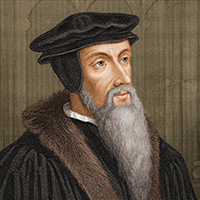 John Calvin: “The Communion of the Saints”
John Calvin: “The Communion of the Saints”
Calvin takes as his launching point here the Apostle’s Creed, and especially the phrases the Holy, Universal Church and the Communion of the Saints. While the Reformers were often characterized as anti-establishment, they indeed took the importance of the Church, both universal and local, very seriously.
We begin here with him in mid-thought, but it becomes clear how deeply he appreciates the church, and how he calls us to do so as well. Calvin tells us of the great importance and benefits of our communion with one another (which we tend to overlook), and warns of the danger of abandoning this important aspect of following our Lord.
And hence the additional expression, the “communion of saints” [Calvin refers here to the Apostle’s Creed]; for this clause must not be overlooked, as it admirably expresses the quality of the Church; just as if it had been said, that saints are united in the fellowship of Christ for this purpose, that all the blessings which God bestows upon them are mutually communicated to each other. This, however, is not incompatible with a diversity of graces, for we know that the gifts of the Spirit are variously distributed. Still a community is asserted, such as Luke describes when he says, “The multitude of them that believed were of one heart and of one soul” (Acts 4:32); and Paul, when he reminds the Ephesians, “There is one body, and one Spirit, even as ye are called in one hope of your calling” (Eph. 4:4). For if they are truly persuaded that God is the common Father of them all, and Christ their common head, they cannot but be united together in brotherly love, and mutually impart their blessings to each other.
Then it is of the highest importance for us to know what benefit thence redounds to us. For when we believe the Church, it is in order that we may be firmly persuaded that we are its members. So available is communion with the Church to keep us in the fellowship of God. In the very term communion there is great consolation; because, while we are assured that everything which God bestows on his members belongs to us, all the blessings conferred upon them confirm our hope.
We see that God, who might perfect his people in a moment, chooses not to bring them to manhood in any other way than by the education of the Church. We see the mode of doing it expressed; the preaching of celestial doctrine is committed to pastors. For, as he did not commit his ancient people to angels, but raised up teachers on the earth to perform a truly angelical office, so he is pleased to instruct us in the present day by human means.
We have said that the symbols by which the Church is discerned are the preaching of the word and the observance of the sacraments, for these cannot anywhere exist without producing fruit and prospering by the blessing of God. I say not that wherever the word is preached fruit immediately appears; but that in every place where it is received, and has a fixed abode, it uniformly displays its efficacy.
Wherefore let these marks be carefully impressed upon our minds, and let us estimate them as in the sight of the Lord. There is nothing on which Satan is more intent than to destroy and efface one or both of them–at one time to delete and abolish these marks, and thereby destroy the true and genuine distinction of the Church; at another, to bring them into contempt, and so hurry us into open revolt from the Church. How perilous, then, nay, how fatal the temptation, when we even entertain a thought of separating ourselves from that assembly in which are beheld the signs and badges which the Lord has deemed sufficient to characterize his Church!
~ From John Calvin’s The Institutes of Christian Religion, book four, chapter one.


